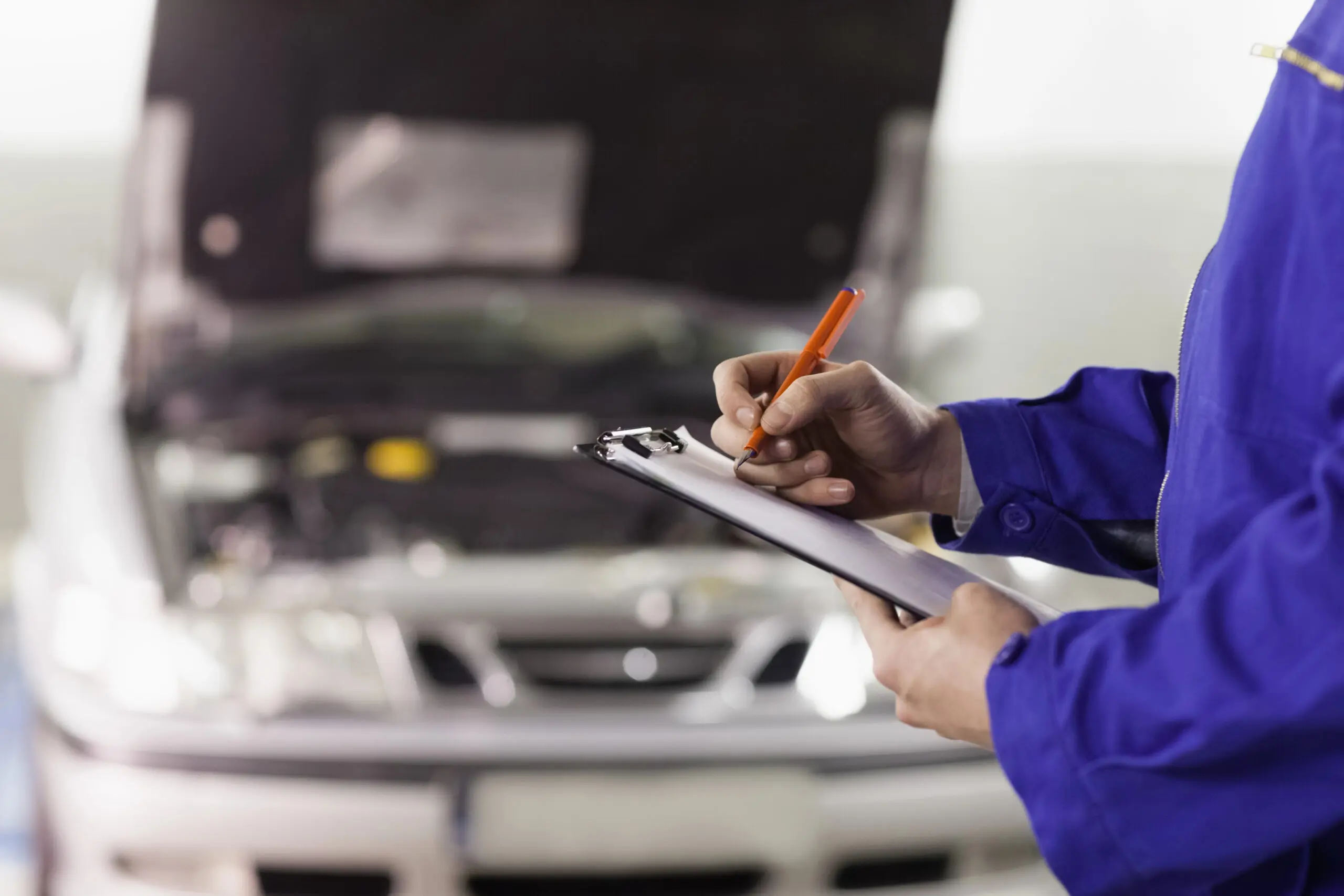If your engine has experienced damage from overheating, you may notice symptoms like burning scents, fluid leaks, or (in a worst-case scenario) a cracked engine block. If you suspect your engine may be damaged due to overheating, it’s best to have it assessed by a mechanic.
QUICK LOOK
- Engine damage from overheating can cause fluid leaks, burning smells, strange engine sounds, and even a cracked engine block.
- Symptoms of engine damage should be assessed by a mechanic to prevent further damage and avoid expensive car repairs.
- Common causes of engine overheating include low oil levels, cooling system leaks, and radiator failure.
Symptoms of engine damage from overheating
Vehicle engines run at blazing hot temperatures, but there is such a thing as too hot.
Generally speaking, normal engine operating temperatures can range from about 195°F to 220°F, depending on the vehicle.
When a car overheats beyond that range, serious and expensive damage may ensue—and sometimes, you might not even be aware something happened until symptoms arise.
The following are some common symptoms that could mean your engine experienced damage from overheating.
Coolant leak
If you discover your vehicle is leaking coolant, your engine temperature might not be properly regulating, in which case you’ll want to check your current engine coolant levels and look for other signs of potential damage.
The antifreeze fluid can range in color depending on what kind your vehicle uses, so if you’re not sure about the source of your fluid leak, have a mechanic take a look.
Knocking or ticking sounds
If you hear mysterious ticking noises coming from your engine, it may be due to a loss of lubrication, which could be related to overheating.
Oil is designed to circulate at a certain viscosity (or thickness) within a specific temperature range. Excess heat can cause the oil to get thinner, after which your engine components won’t be properly lubricated—which can increase the wear and tear they experience and eventually cause damage.
Low oil levels or oil leak
Engine oil also plays a role in protecting your vehicle from overheating. It’s not the oil’s viscosity level that helps keep your engine’s components properly lubricated—how much oil you have also matters.
If your oil level is too low or you’ve discovered an oil leak, your engine could be at risk of overheating if it hasn’t already.
Engine gets extremely hot, even after short trips
As we’ve already established, engines generate a lot of heat. Naturally, your car’s engine heats up after you’ve made a trip in your vehicle, but it shouldn’t get extremely hot—especially after short trips.
If this is the case, there could be a problem with the cooling system signaling that the engine’s temperature isn’t being properly regulated.
Rising temperature gauge reading or dashboard warning lights
If your engine is overheating, one of your first indicators may be the temperature gauge on your dashboard. If your temperature gauge needle is moving into the red zone, it’s time to let your engine cool down and evaluate what the cause might be.
Additional indicator lights, like the check engine light, may also illuminate on your dashboard related to coolant levels or engine temperatures.
Damaged pistons
Excessive heat can cause pistons or piston rings in your engine to warp or break—which can be quite complicated and expensive to repair.
Cracked engine block
This is one of the most severe signs of damage to your engine. An overheating engine could expand to the point where parts of the engine develop cracks, which could spring oil leaks and affect how the engine functions.
By the time engine block cracks appear, it’s often best to replace your entire engine rather than try to repair it.
Strange odor coming from the engine
If you smell scents like oil, hot metal, or burning rubber coming from your engine, it may be a consequence of overheating.
Worsening engine performance
Worsening engine performance can be related to a whole host of problems, and an overheating engine is one of them.
When an overheating car engine experiences too much damage, it won’t be able to run the way it’s supposed to. That might show up in different ways when it comes to engine performance.
You might notice rougher idling at stop lights or a reduced fuel economy, or you may find that accelerating is more difficult than usual.
Causes and consequences of an overheating engine
Myriad reasons can lead to overheating issues in a vehicle.
Some of the most common causes of an overheating engine include:
- Low oil levels
- Cooling system leaks or clogged coolant hoses
- Faulty water pump
- Damaged or blown head gaskets or warped cylinder heads
- Radiator failure or damaged radiator cap
- Faulty thermostat
- Extending your vehicle beyond its performance capabilities
- Skipping essential maintenance items
Excess heat can cause serious damage to a vehicle’s engine. If problems leading to an overheating engine are caught early enough, they can be addressed before further damage happens.
The necessary fixes could be as simple as refilling your oil or coolant levels or replacing a single component.
However, if an engine continues to overheat too long, the damage could become increasingly severe, and in some cases, may not be salvageable at all. When engine block cracking occurs, for example, it may be necessary to replace your entire engine.
Learn more: Why does my car overheat when the AC is on?
What to do if your car engine overheats
If the needle on your vehicle’s temperature gauge is rising into the red territory—or if a warning light on your dashboard is warning you about coolant levels or your engine temperature—you should stop driving as soon as possible and allow your engine some time to cool off.
If you’re concerned that your engine may have overheated, have a mechanic inspect your engine for signs of damage to evaluate whether any repairs or replacements are necessary.
How to prevent an engine from overheating
The best way to combat an overheating engine is to prevent it from happening in the first place. Here are some steps you can take:
- Perform basic routine maintenance, like oil changes and cooling system inspections, at the proper intervals
- Repair problems like leaks as soon as they’re discovered
- Monitor coolant and oil levels periodically
- Turn your engine off before it reaches extreme temperatures
FAQ
-
How long does it take for an engine to overheat?
-
How do I know if my engine is damaged?

Melanie Mergen is an insurance writer with more than 8 years of writing, research, and editing experience. She’s covered topics like car insurance, home insurance, finance, and car ownership for Jerry. Her mission in doing so is to help people secure and protect their most important assets while making the best possible use of their finances.
Prior to joining forces with Jerry, Melanie worked as a freelance content writer and editor, a teaching artist, and journalist. She received her Creative Writing MFA from Columbia University.
Melanie Reiff is an expert insurance writer and editor with over half a decade of experience in professional writing. Guided by a lifelong love of storytelling, it’s Melanie’s mission to help people problemsolve by means of creative and engaging content. Melanie specializes in analyzing the ways in which society, technology, and culture intersect, previously working with clients in travel, technology, and social impact to tell their stories.
As an editorial team lead at Jerry, Melanie has translated her prior experience into creating and editing insurance content that can help drivers and homeowners find the solutions they need and make informed moves.
Prior to joining Jerry’s editorial team, Melanie worked as a freelance content marketing strategist and was the full-time director of choir at Rampart High School Acadamy in Colorado Springs.







